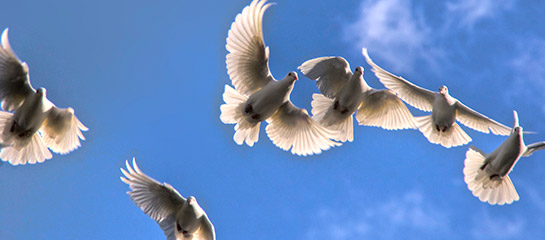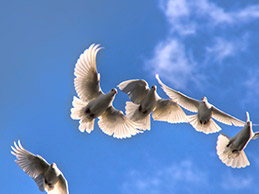By Joanna Kleovoulou, Clinical Psychologist and Founder of PsychMatters
Whether you believe in and celebrate Christmas or not, this time of the year is usually synonymous with values of forgiveness, peace, love, restoration and cheer. Reflecting on the year and thinking about the new year’s prospects, is often in our thoughts at this time. One of the most moving memories for me and perhaps for many around the world was the loss of our own father, Madiba. Given his peace-loving virtues and legacy he has left for generations to come, I thought it befitting to close 2013 off with a reminder of what peace means, not only in your own inner world and within your family, but on a global level. PsychMatters would like to thank all our clients and our community a peaceful and restorative break. Thank you for entusting us with our services, and we look forward to assisting you and your family in future.
At Madiba’s funeral, many dignitaries and world leaders were here in South Africa to share in our country’s grief. One such person, who believes in the movement towards peace worldwide, Sir Richard Branson, founder of Virgin, visionary and business tycoon, was interviewed by Oprah Winfrey on an organisation, called The Elders. Co-founded by Sir Branson, the likes of Madiba, Kofi Annan – previous UN secretary-general, Nobel Peace Prize winner Bishop Desmond Tutu, Mary Robinson past UN High Commissioner for Human Rights and Ireland’s first female president, former US president Jimmy Carter , stand together with a total of 12 nominated Elders worldwide, to work towards giving world PEACE a chance, to stop wars, eradicate disease and control global warming.
Oprah Talks to Richard Branson, Snippets taken from the December 2007 issue of O, The Oprah Magazine , Read more: http://www.oprah.com/world/Oprah-Interviews-Richard-Branson/8#ixzz2o0OnRwF2
“Most wars are completely unnecessary,” Branson tells me (Oprah) on the afternoon of our conversation. “Intelligent people must come up with alternative ways to disagree.” For a man whose optimistic outlook led him to attempt the improbable four decades ago, the Elders is a fledgling investment that could bring an extraordinary return: the possibility of long-standing world peace.
Richard: I don’t live my life thinking about “if only.” I just try to think positively about the future. We’ll never know for certain what would have happened if we’d gone to Iraq. The important thing is that we’ve got to do everything we can to prevent other wars. Peter and I created the Elders because we want leaders to arbitrate in conflict situations like the one between the Algeria-supported Polisaro Front and Morocco over the Western Sahara, or the crisis in Darfur. We all know about the big world conflicts: Israel and Palestine, Zimbabwe, and so on. But there are smaller conflicts that aren’t even on the world’s radar screen; most of the world has no idea that Ethiopia invaded Somalia a year ago. It makes sense for the Elders to sit down with both sides and see whether leaders can come to an understanding.
Oprah: What is your ultimate hope and expectation for the Elders?
Richard: I’d love for the Elders to still be around in a thousand years’ time. I want to see the group build credibility in the world. I’d also like them to address other major issues, like global warming, dwindling fish stocks, and the horror of unnecessary disease. For instance, AIDS should never have gotten out of control in Africa; it’s unforgivable that the world community allowed it to get out of hand.
Oprah: If the Elders had existed 20 years ago, what difference do you think they might have made in the spread of AIDS in Africa?
Richard: They would have alerted the world to the issue, and if a particular president was denying that AIDS was related to HIV and that it was becoming a crisis, they would have had a quiet word with him or her. By moving quickly in situations like that, the Elders would be able to caution the world, and then get the resources to deal with a problem in its infancy.
Oprah: What happened the first time you gathered the Elders in one room? Were you nervous or intimidated?
Richard: Well, I’d already been spending a lot of time with Archbishop Desmond Tutu. He’s one of the best human beings alive.
Oprah: There’s no better spirit or vibe to be around.
Richard: And he has an absolutely wicked sense of humor!
Oprah: You always look so radiant and joyous in your photos. Is that your natural temperament?
Richard: I have tremendous stability in my life. My wife and I have been together for 32 years, and we’re very happy. I’ve got two wonderful children, my parents, and great friends around me. And then there are the more than 50,000 wonderful people who work for the Virgin companies. I have no excuse not to be happy.
Oprah:. How do you maintain a sense of connection with 50,000 employees? Can you?
Richard: It’s impossible to feel the same connection as when there are only four or five starting off, but the people who work for me are working for what I believe in. The leaders who run our companies do so on the basis of those who came first and who said, “A company is its people.” I hope my companies are run on the basis of praising their workers and looking for the best in them, not criticizing them. In the same way that you water a plant and it sprouts leaves, people flourish when you praise them. We have people who would kill for Virgin because they’re so proud of it—they believe in what we’re creating.
Oprah: What are you most hopeful about right now?
Richard: People are basically decent. Sadly, they sometimes don’t appoint very good leaders, and those leaders create some horrendous messes. Yet I’m hopeful that after Iraq, those in charge will think twice about taking us down that route again. I hope that the 600,000 civilians we’ve lost—men, women, and children—will not have died in vain.
Oprah: How do you feel about the survival of the planet?
Richard: This issue is of paramount importance—global warming could snuff out humankind. It’s an invisible war that could ultimately destroy life itself, and we need politicians and businesspeople to get together and treat it as a third world war. If we can’t get our governments to wake up and do something about it, then I’m not hopeful.
Oprah: What do you know for sure?
Richard: I know that I’ve got to live life to its fullest because I’m going to die one day. I don’t want to waste a minute.
Oprah: What’s the source of your drive to contribute to the world? It feels like an extraordinary force.
Richard: [Laughs] If anybody knows about that force, you do! I love creating things, and as an entrepreneur, I’ve taken on quite a lot of major corporations and done well. Capitalism is the only system that works, but it has its flaws; for one, it brings great wealth to only a few people. That wealth obviously brings extreme responsibility.
Oprah: That’s not so obvious. You could decide to play all day: fly balloons, race around the world, stretch out on an island and drink tequila.
Richard: True. In part, giving back has to do with the way I was brought up and the fact that I’ve travelled widely and seen terrible situations in the world. To sleep well at night, those of us who are in a position to help must address these situations. I’d get far greater satisfaction out of, say, walking into a hospital I’d built in South Africa than I would by sitting on a beach. I’m fortunate enough to be in a position to make a difference, and I don’t want to waste that. I suspect I was also lucky to have parents who drove me from a young age.
Oprah: Where did the idea for the Elders come from?
Richard: In Africa, villagers look up to elders; they are the moral voice of their community. My friend Peter Gabriel and I felt that the world needed a group of wise leaders to look up to—men and women who are beyond ego, who can look past their borders and take on global issues. That’s why we created the Elders—a group of 12 respected people who can intervene in the world’s conflicts. Before the Iraq war, I was involved in attempting to avert the conflict. I felt that the only way it could be stopped would be for an elder of great stature to persuade Saddam Hussein to step down and go live elsewhere, in Libya or Saudi Arabia—the same way Idi Amin [the late Ugandan dictator and president] was persuaded to step down. I had hoped we could avoid maiming and killing thousands of people and all the misery to follow. Nelson Mandela seemed to be the obvious elder to do that, since he’d already spoken out against the war. I talked to him, and he agreed to see Saddam if Kofi Annan [former secretary-general of the United Nations] would go with him and if South African president Thabo Mvuyelwa Mbeki gave his blessing. A week later, both agreed, but that same week, the bombing began. So the conversation between Hussein and Mandela never took place.
Oprah: Last question. The Elders have the potential to do powerful work in the world. But what is your hope for ordinary citizens at home?
Richard: Peter Gabriel’s desire is to use the Internet to connect leaders and citizens everywhere. In particular, we’d like to use retired people as a resource. There are so many incredible people who have knowledge that is often wasted in their later years; why shouldn’t a doctor continue using his or her expertise? We want to create local groups of respected elders who can play a part in their communities. I think every person can make a difference. You don’t have to be one of the Elders. You don’t have to be well known. You just have to be determined to care about people. That’s all it takes.
For guidance and support to find a place of peace within your relationships, contact PsychMatters Family Therapy Centre on (011) 450-3576.



